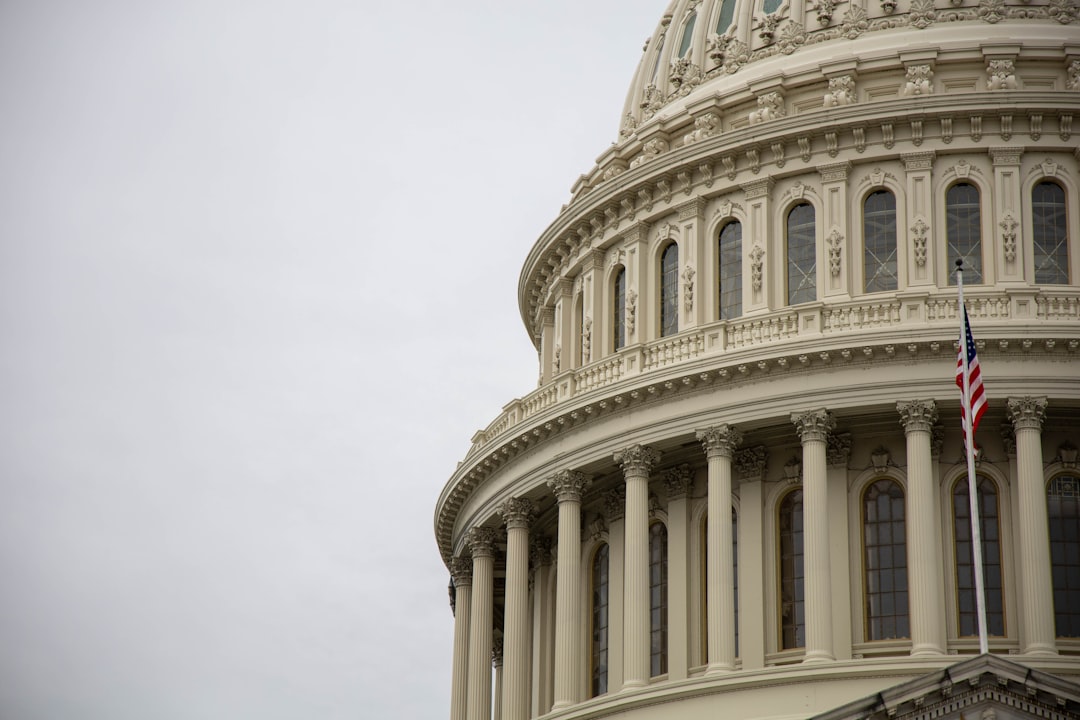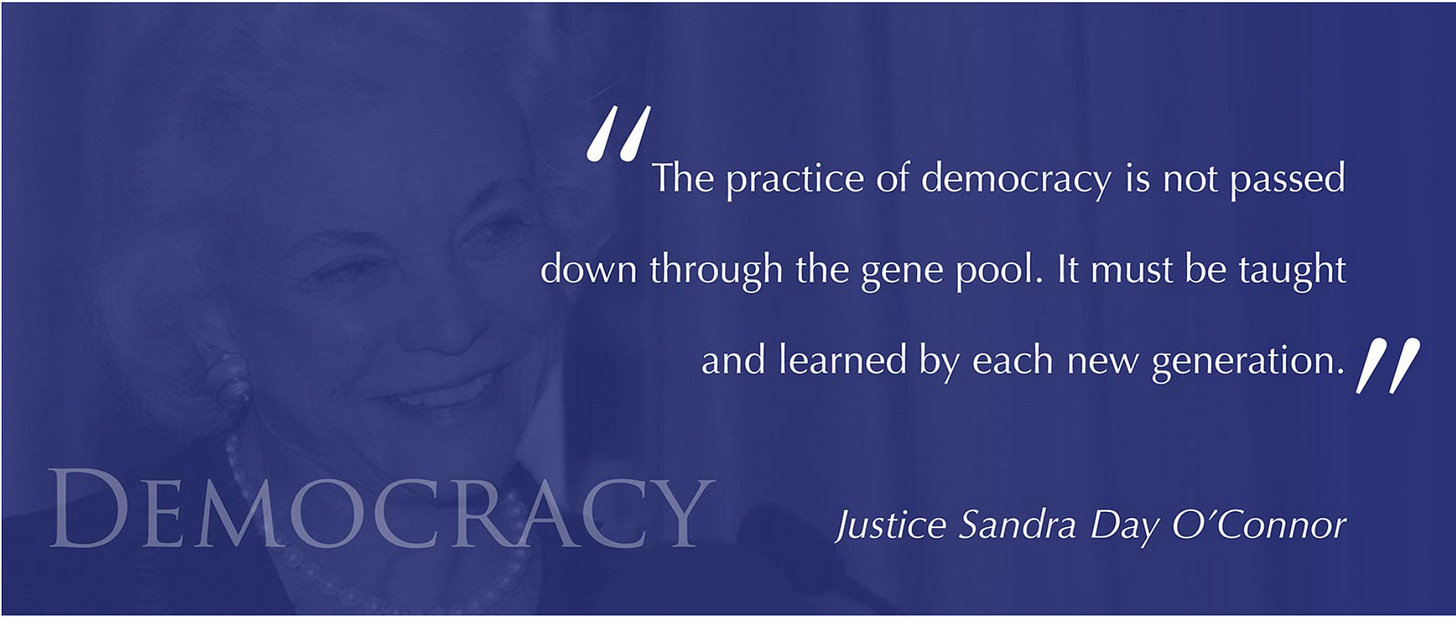Time is Running Out: The Critical Necessity for Civics Education in Contemporary America
Civic Ignorance is Deadly to the People and the Nation
Civics education is not merely a desirable part of an educational curriculum; it is a crucial and urgent need in America today. The nation's democratic ideals, governance structures, and citizens' responsibility to participate in democracy depend heavily on a comprehensive understanding of civics. The recent upsurge of examples of civic ignorance underscores this urgency and brings the call for civics education into stark relief.

"I think we're in the endgame right now," says actor Richard Dreyfuss amid a decline in civics education. "I think that we could let slip the greatest idea for governance ever devised, and we won't even know that it happened. We have no muscle memory of it."
Think the Oscar winner is being dramatic? I don’t.
Consider a survey conducted by the Annenberg Public Policy Center in 2018, where only 39% of American adults could name the three branches of government. Even more alarming, a 2017 survey from the University of Pennsylvania found that 37% of Americans couldn't name any of the rights protected by the First Amendment. This data illustrates an alarming deficiency in basic civic knowledge, a gap that can and should be addressed with robust civics education.
Further instances of civic ignorance can be seen in the widespread propagation of misinformation and conspiracy theories. The misinformation surrounding the 2020 elections, including the baseless claims of election fraud that culminated in the Capitol Hill riots of January 2021, underlined the dangerous consequences of a populace ill-informed about its own democratic processes. Similarly, the resurgence of conspiracy theories such as QAnon underscores the urgent need for comprehensive civics education that can cultivate critical thinking skills and foster a more informed, engaged citizenry.
As political scientist and professor Michael Delli Carpini notes, "Knowledge is a cornerstone of democracy. It is more than just an 'informed citizenry'—it is about understanding the system, engaging with it, and recognizing the power and responsibility we hold within it." Without this foundational understanding, citizens cannot effectively engage in civic life or make informed decisions about the leadership of the nation.
Civic Ignorance is Deadly
One of the most striking examples of civic ignorance among a subset of the American public came in the wake of the 2020 Presidential Election, as then-President Donald Trump and his supporters sought to challenge the results. The Vice President's role in certifying the Electoral College results was severely misunderstood by many, leading to an atmosphere of misinformation and tension, to say the least.
The U.S. Constitution states in Article II, Section 1 that the Vice President's role is to open and count the Electoral College votes in front of both houses of Congress. The Vice President does not have the power to unilaterally reject or overturn these results, a fact clearly stated in our nation's foundational document.
Nevertheless, in January 2021, thousands of Trump supporters descended on Washington, D.C., many of them under the misguided belief (and I suspect some were willingly ignorant) that Vice President Mike Pence could and should overturn the results of the election. Expressing their anger that he had not "stopped the steal," a phrase that had been used to propagate baseless claims of widespread election fraud, literally cost people their lives.
The fact that these individuals fundamentally misunderstood the Vice President's constitutional role underscores the dire need for more comprehensive civics education.
Notably, even President Trump himself seemed to misunderstand—look, I’ll say it, the man’s an oaf, but I also think it suited his purposes to cynically lead ignorant people to assume he believed that Pence could “stop the steal.” The Vice President's role in this process, as he tweeted, "All Mike Pence has to do is send them back to the states...and we win. Do it Mike, this is a time for extreme courage!"
This further propagated the misunderstanding—willful or otherwise—among his supporters and further demonstrates the urgency and necessity of an improved civics education for all citizens.
Citizenship is Taught
Justice Sandra Day O'Connor's words echo all the more resoundingly in the light of these events: civic knowledge and understanding are not inherent - they must be taught. The failure to understand a critical aspect of the democratic process during such a pivotal moment in our nation's history makes it painfully clear that the need for comprehensive civics education is more urgent than ever before.
The detrimental effects of civic ignorance aren't merely abstract; they have concrete impacts on policy decisions and political participation. A 2020 study in the journal "Political Behavior" revealed that citizens with higher civic knowledge are more likely to vote and to be politically engaged. The lack of civic education directly translates to lower engagement, which threatens the core of the democratic system: the active participation of its citizens.
In light of these pressing concerns, the urgent need for civics education in America becomes clear. A lack of understanding of democratic institutions, coupled with a tendency toward misinformation and conspiracy theories, presents an existential threat to democracy itself.
As President Franklin D. Roosevelt once remarked, "Democracy cannot succeed unless those who express their choice are prepared to choose wisely. The real safeguard of democracy, therefore, is education."
Test Everyone
I’ll take it a step further. I think the citizenship test that all people wishing to become American citizens must pass should be administered to everyone as a condition of earning a high school diploma. Seriously--if natural-born Americans are not taught the very basics of American citizenship, then what is the point of trying to save our country?
A dedicated effort towards improving and expanding civics education is not only a need but an obligation. It will foster an informed, engaged citizenry capable of upholding America's democratic values, acting as responsible stewards of its democratic processes, and combating misinformation. Only through a profound understanding of the principles, processes, and responsibilities of citizenship can the promise of American democracy truly be fulfilled.


